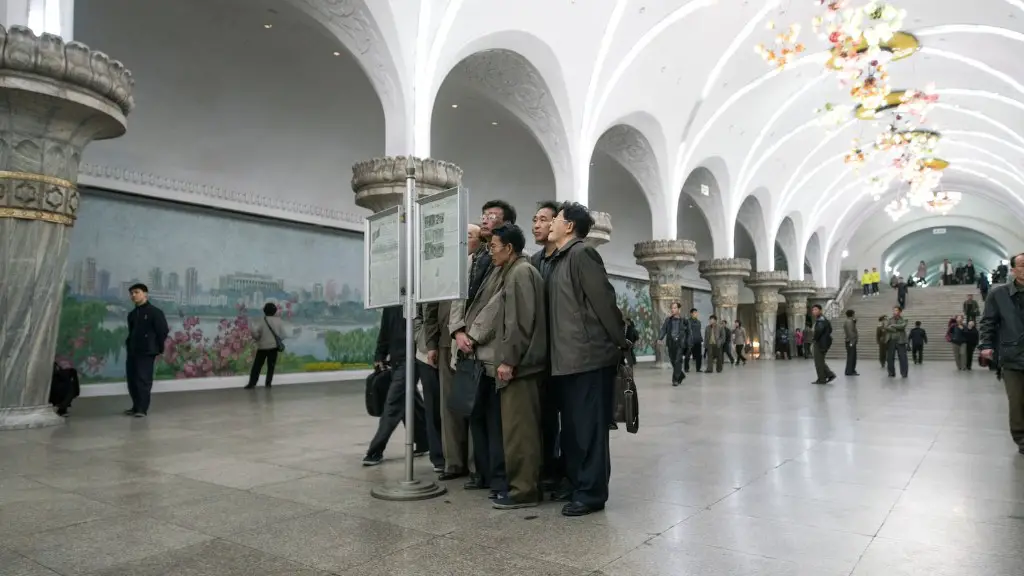Background Information
The relationship between the United States and North Korea has been fraught with tension and mistrust. In fact, the two countries have not established full diplomatic relations since the Korean War hostilities ended in 1953. Tensions continue to simmer as North Korea expands its nuclear weapons program, prompting strong criticism and condemnation from the U.S. government.
With the current tension levels, one might assume that the U.S. would have never provided financial assistance to North Korea in the past. But in fact, the U.S. has given hundreds of millions of dollars in foreign aid and humanitarian assistance to the North Korean people since the 1990s.
Relevant Data
According to the U.S. State Department, the United States has provided over $1.3 billion in total assistance to North Korea since 1995. This includes $946 million in food assistance, $223 million in humanitarian assistance, and $165 million in non-food assistance. Of the total, $867 million was provided through international organizations such as the World Food Program and the United Nations Development Program.
The U.S. has also provided $20 million in grants for North Korean refugees and North Korean defectors in South Korea since the 2000s, and an additional $20 million for humanitarian assistance in 2010.
Perspectives from Experts
The U.S. government’s decision to provide aid to North Korea has often been criticized by experts. They argue that providing aid to the North Korean regime simply rewards their bad behavior and is not an effective strategy for convincing them to abandon their nuclear weapons program.
“What I don’t understand is why we would be giving direct assistance to North Korea, especially when they’re actively pursuing nuclear weapons,” said Joshua Stanton, a Washington, D.C.- based lawyer who specializes in North Korean issues. “It’s not a good use of our resources, because it’s essentially paying off Pyongyang and that doesn’t solve the fundamental problems.”
Analysis
The U.S. government’s decision to provide aid to North Korea appears to be based in part on its commitment to promoting human rights and aid to those in need. In response to the devastating famine in North Korea in the mid-1990s, the U.S. provided humanitarian assistance and food aid – including over $400 million in 1998 alone.
However, it is clear that providing humanitarian aid to North Korea is not enough to address the root issues in the country. After years of receiving aid from the U.S., North Korea still adheres to a repressive and highly oppressive regime.
Sanctions Imposed
In response to North Korea’s ongoing nuclear weapons program and human rights violations, the U.S. and other countries have imposed sanctions on North Korea, including an arms embargo and restrictions on trade, finance and travel. The U.S. has also imposed targeted sanctions against certain individuals and entities in North Korea.
The U.S. has also been actively involved in international efforts to pressure North Korea to abandon its nuclear program, most notably through the 2016 United Nations Security Council Resolution 2250 and its provision of humanitarian assistance through the United Nations Central Emergency Response Fund (CERF).
Economic Consequences
The economic impact of these sanctions on North Korea has been devastating. According to some estimates, the sanctions have cost North Korea as much as 80 percent of its annual export revenue. The North Korean economy is estimated to have contracted by 3.5 percent in 2017, and the U.N. estimates that 70 percent of North Korean’s are food insecure.
The sanctions have also impacted the North Korean people. In addition to severe food shortages, the sanctions also affect access to necessary medical supplies and basic necessities such as fuel and electricity.
Concerned NGOs
The devastating effects of the sanctions on the North Korean people have prompted a number of non-governmental organizations (NGOs) to call for the easing of sanctions. These organizations argue that the sanctions are causing the opposite effect-causing more suffering and hardship-than they are intended to prevent.
“The current sanctions regime is punishing citizens and should be regularly assessed and adapted to safeguard civilians and ensure that humanitarian access is not obstructed,” said Vivian Tan, spokesperson for the United Nations High Commissioner for Refugees (UNHCR).
Role of China
China is North Korea’s most important ally, and it has been instrumental in supporting the North Korean economy in the face of sanctions. China is North Korea’s largest trading partner, and over 90 percent of North Korean imports come from China. China has also been accused of helping North Korea evade international sanctions, which has led to increasing tensions between the U.S. and China.
Growing Tensions
The growing tensions between the United States and North Korea have led to a number of international crises and heightened the risk of a possible military conflict. Although the U.S. has provided aid to North Korea in the past, it is not likely to provide any further assistance while these tensions remain.
In the meantime, the U.S. and other countries are working together to adopt a unified approach to the North Korean crisis, including working to persuade North Korea to abandon its nuclear weapons program through diplomatic means and implementing targeted, multilateral sanctions against the regime.


